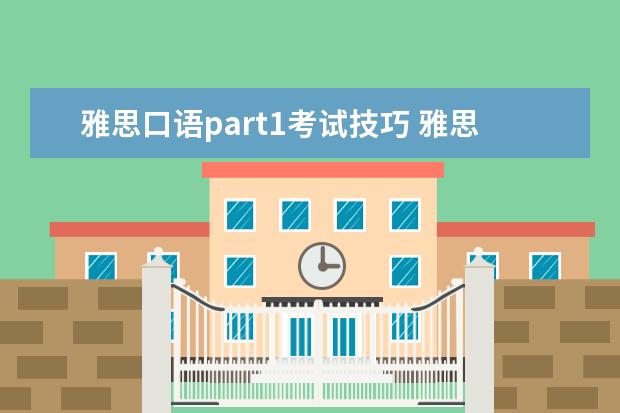雅思考试主要是通过对考生听、说、读、写四个方面英语能力的考核,综合测评考生的英语沟通运用能力,实现“沟通为本”的考试理念。对于雅思考生来说,也有很多考试难点和政策盲区需要帮助解答。今天雅思无忧网小编准备了雅思口语part1考试技巧 雅思考官教你雅思口语PART1考试技巧,希望通过文章来解决雅思考生这方面的疑难问题,敬请关注。

雅思口语Part 3的答题技巧演示。
今天,环球青藤朱滚睁国伟老师和大家分享一篇关于雅思口语Part 3的答题技大毕岁巧演示文章,值得大家阅读学习。更多精彩好文章,尽在环球青藤!雅思口语Part 3问题1:What are some reasons why people eat out ?雅思口语数唤Part 3的答题技巧演示1:It’s a tradition that we intend to treat our friends and family on some special occasions , especially on birthday , and some important days . a fancy restaurant can provide us decent dining environment , delicious cuisines and thoughtful service . by the way , these days , office workers are getting busier , they have no time to prepare home cooked food , eating outside is the only remaining option .雅思口语Part 3问题2:Do you prefer to eat at a restaurant or eat at home ?雅思口语Part 3的答题技巧演示2:I prefer to eat at home . my mother is good at cooking , she usually prepares a table of delicious dishes at home . by the way , my country has a notorious reputation of food security . so eating at home is much safer.雅思口语Part 3问题3 What are the differences between eating at home and eating at restaurants ?雅思口语Part 3的答题技巧演示3: Eating at restaurants , you may enjoying a decent dining environment , cuisines with different taste and flavor , and thoughtful service . compared to eating at restaurant , dishes prepared at home are simple but balanced and nutritious .雅思口语Part 3问题4In my opinion what is healthy food ?雅思口语Part 3的答题技巧演示4: A healthy meal should be balanced and nutritious . in each meal , we need to intake various vegetables , different kinds of fruits and many types of proteins . by such way , we may maintain a good physical health .雅思口语Part 3问题5What are some examples of unhealthy food ?雅思口语Part 3的答题技巧演示5:In my opinion , there are many types of unhealthy food , like western style fast food , desserts with high calories , and food sold at street vendors . food like French fries , hamburgers are very harmful to our health .以上即是本次环球青藤口语老师朱国伟的关于雅思口语Part 3的答题技巧演示文章分享。逻辑能力强,精通口语词汇。对于欧美的文化很了解。多年的教学经验帮助了不少雅思考生顺利进入理想学府,桃李满园。相信他的这篇文章必定能给与烤鸭们不少帮助和启发。如果对于我们雅思课程想了解更多的话,欢迎与环球青藤课程顾问做进一步的咨询与了解,这里有不同的单项课程以及全项课程,适合不同要求的你!后,环球托福预祝各位雅思考试取得!早日圆满出国留学梦!
雅思口语part3做题技巧?我这部分总是分数比较低 - ...
洛阳大华雅思提醒您,
一)题目的性质从原来较为生活化的Part 1和Part 2转化为Part3中带有强烈学术意味的考题。比如How does scientific research benefitspace, medical, environmental and information technologies? 该题问科学研究给现代技术带来怎样的好处。
二) 很多考题不再注重具体的细节描述或陈述,而转向考察考生的抽象思维能力。比如Does money bring people more happiness or make them less secure? 该题问钱会给人带来幸福,还是使人更不安全。碰猜拿
三)有相当数量的题目会让考生去对某个话题进行评估(Asses*ent),特别是利弊方面的评估;还有些考题让你对未来进行猜兆局测(Speculation),让你说10年或20年之后某事物将会怎么样。比如In your opinion, what languages will become morepopular in the future? 该题要你猜测将来什么语言会变得流行起来。当然,你还必须说明理由。
总的来说,Part 3已经超越了日常生活层面,进入到人的深层思维体系之中。它着重的是四样东西:world views(世界观),beliefsystems(信仰体系),values(价值观),attitudes(态度)。要把这些东西说好,除了平时的语言功底和随机应变的能力以外,考生还需要具备一些人文方面的素养。
虽然Part 3的问题错综复杂,但根据笔者的教学及实战经验,我们完全可以把所有Part 3的考题分为以下的九个大类,每一大类都含有若干典型的问话套路:
一)阐述原因(Giving reasons)
Why do you think …?
Why is it important to do…
Do you think …? Why (not)?
Is it a good idea to (do…)? Why (not)?
二)预测未来(Providing speculations)
How do you see … changingin the future?
Do you think that in thefuture people will …?
What do you think willhappen to … in the future?
In your opinion,which/what … will become more … in the future?
三)描述侧面(Describing various aspects)
In what ways …?
What kind/sort/type of …?
How important is it for …to (do …)?
How has … changed (in yourcountry) in the last … years?
四)维护立场(Defending your choice)
Is it better to (do …) or(do …)?
笑搭Should people always … oris it a good idea sometimes to (do …)?
Which is more important toyou: … or …?
Which do people in yourcountry prefer: … or …?
五)利用常识(Using your common sense)
Any yes-no question thatinvolves a clearly positive or negative answer
Any question that asks youabout the roles, responsibilities and general qualities of a social group
Any question that asks youabout common knowledge, everyday experience and traditional culture
六)提供方案(Offering solutions)
What can … do to (do …)?
What can be done to (do…)?
What do you think is thebest way for … to (do …)?
Are there other wayspeople can …, apart from …? How?
七)因果关联(Connecting causes with effects)
What effect has … had on…?
How has … affected …?
Are there any negativeeffects of … doing …? What are they?
What do you think causes …to …?
八)对比异同(Comparing similarities and differences)
How does … compare with …?
How do you compare … with…?
Do you think … wasdifferent for your grandparents?
What are similarities anddifferences between … and …?
九)陈述利弊(Illustrating advantages and disadvantages)
What are the advantages anddisadvantages of …?
What are the differentadvantages of … and …?
What do you think theirdisadvantages are?
How do people in yourcountry feel about (a controversial issue)?
从《剑桥雅思》的口语出题风格来看,一般一套口语题的Part3部分会有6道问题,这一点大家可以参阅《剑一》到《剑七》的真题。下面的这套题从place到travel/touri*再到old buildings/historic buildings,提出了一系列问题:
Why do you think peoplelike to travel to different places?
→ 第一类:阐述原因(Giving reasons)
How do you see touri*changing in your country in the future?
→ 第二类:预测未来(Providing speculations)
Why is it important toprotect the countryside?
→ 第一类:阐述原因(Giving reasons)本文
In what ways is thecountryside in danger in your country?
→ 第三类:描述侧面(Describing various aspects)
Why are historic buildingsand monuments important to a city?
→ 第一类:阐述原因(Giving reasons)
Is it better to keep oldbuildings, or build new modern ones?
→ 第四类:维护立场(Defending your choice)
由此可见,任何Part 3的问题都可以归入以上九大类中的某一类。在本系列的后面九讲中,针对每一类问题的特殊性,为大家一一分析破解它们的方法,也希望广大“烤鸭”们能切实利用这些方法来为自己的考场发挥添砖加瓦。
总的来说,雅思口语考试Part 3作为考试中第三部分,也是最困难的一个部分,所以把握好总结的雅思口语考试Part 3答题技巧也就非常重要.
雅思口语part3考试有哪些技巧?
1. 询问确认,理解所问
在考试中紧张的心态导致没理解好考官问题是很正常的。这是与其埋头自责,不如主动出击询问清楚考官到底想问什么,懂得询问不仅让考官觉得我们愿意和他交流,更重要的时能更好的理解问题,给出相关答案。
相关句式
Sorry, do you mean.......?/ Sorry, you were saying.......?与考官重复确认自己对题目的想法。
What you mean by...你不理解的部分,把大概发音复述,提示考官相关部分。
Can you please rephrase the question?
2. 承接问题,具象分析
如磨毕果在听到问题时未瞎巧芹能第一时间给出题目所问,需要时间思考和分析时,我们可以针对题目中某些关键词给出相关具象分析,然后再回到题目重点。这样可以有效避免尴尬,使讲话的连贯性不会中断。
例如
Why is it important for sports fans to celebrate when their favorite team wins?题目重点问的是对于这样行为的原因,如果未能在听到问宽判题后马上给出回复,可以选择就题目关键词先给出具象分析,在回到题目。
Well I think sports fans like football fans will usually celebrate because they are excited about the victory, they would drink, dance and cheer at the bar; and in terms of its importance, I think……先针对其中的sports fans, how to celebrate 进行具象化。
that’s because doing so is a kind of reward of emotional investment. sports fans must have invested so much time, money and energy to support their team, hoping to witness their victories. Their favorite teams' victory is the result that their efforts paied off.再转回题目,总结这样的做的根本原因。
3. 猜测回应
很多时候当我们遇到问题不确定回答时我们都会手足无措,这时不妨大胆猜测,用自己的想法回答题目,并详细解读分析题目。即使我们的回答不是题目所想要的,但至少我们都在尽量的和考官交流我们的想法。
What indoor games do children like to play nowadays?
Well there are many indoor games children favor now. But I am not so sure what there are. I suppose the most typical indoor game for children now is to gather around to play the video game together because almost every child will have a *artphone, and the most common thing they will do is to play games with it.
That would be all, I think, cuz I am not quite familiar with children’s indoor game.
雅思口语part1一般问多少个问题?part2必须说够两分...
环球教育老师为同学们带来雅思口语变题季口语提分攻略如下,希望对您的闹首备考有所帮助~
雅思考试中,我们都知道,在雅思口语part 1考试中,蔽陪考官会与学生之互致问候,并依据学生在IELTS考题申请表中错填信息内容提一些问题,实际会包含学生的文化教育与工作背景,个人兴趣爱好、喜好等。一些学生仅仅简易详细介绍了一两句就没有话说了,那么雅思口语part1说几句说多久?环球教育北京雅思学习网站小编为同学们带来详细介绍。
这一环节关键调查学生基础的人际交往能力和自己信息简易详细介绍的能力,考试时间大约为1~2分钟。或许由于问题题全是学生所了解的,因此学生回应起来感觉非常简单,轻轻松松。假如在这一环节就焦虑不安,那后边2个环节就不太好收尾了,因此,释放压力,自然灵活处理所出现问题是这一环节通关的重点所在。
雅思口语part1考试时间大约3—4分钟,不必说得太长太多,操纵好这一时间就行,必须提示的是,这一部分,学生理应自信表述自身的见解,清楚一目了然好。
雅思口语part1考试的每一问题的回应时间均值是 20 seconds,短的 10 seconds,长的大概 30 seconds。 可是绝大多数的回应时间在15到25秒中间,在这一时间范围里,尽可能再多 give as much information as possible。
雅思口语part1考试一部分,你能说说你的工作情况,还可以介绍家乡类似的。假如考官有独特要求得话,尽可能按照考官的话题讨论描述。拿下也不必背参考答案,特别是在是逐字逐句的记诵。考官阅历丰富,他们能够很随便德地分辨出你是不是在说你要的还是他人的物品。
雅思学习网站小编坚信学生们针对雅思口语part1说几句说多久?这一问题早已拥有参考答案,这儿也恭祝学生们无论是雅思口语考试part 1还是雅思口语考试part 2,part 3都能一一地解决拿下。
不知道以上内容能否对您的雅思备考有些许帮助,如有雅思备考相关问题可以在评论区交流讨论~~看见后第一时间为同学们解答疑问,希望同学们都可以取得理想的雅思分数~
环球教育秉持教育成就未来的理念,专注于为中国学子提供优质的出国语言培训及配套服务。环球教育在教学中采用“九步闭环法”,帮助学生快速提升学习效能,同时提供液并数优质的课后服务,跟进学生学习进程,为优质教学提供坚强的保障。目前,环球教育北京学校已构建了包含语言培训、出国咨询、国际课程、游学考察、在线课程等在内的一站式服务教育生态圈。相关问题可在线免费咨询,或拨打免费热线400-616-8800~~
雅思考官教你雅思口语PART1考试技巧
上海环球青藤为大家带来一份由雅思考官写的雅思口语part1考试技巧,各位考生可以根据雅思口语考官的建议来准备雅思口手陵链语考试。希望对毕孙大家雅思口汪或语备考有所帮助。IELTS is set into three sections.
Part 1 is generally something about you, where you are from, do you like something, what do you think of something etc.
So you can prepare before the test to answer some of these questions. Of course you can't prepare for all things, as the examiner may throw in a few curve balls (tricky). This exchange of questions is going to be about 5 minutes.
When asked a question, for example, “Where is your hometown?” you might answer“Shanghai” This is correct but hardly a worthy answer that will convince the examiner to expect a lot from you.
Give the place and then say something about it as this shows you can engage in a conversation and not just regurgitate (give) facts and names. Maybe say something about the city, location, size, the fact you might not know much about it because you left at a young age.
“I come from China's largest city Shanghai, on the coast; do you know the area of Minhang in Shanghai? That is the part of Shanghai I was born”
A bit more than just one word.
Chances are you will get a follow up question as this is a conversation and in conversations you garner (get) information from those you are talking too.
“Can you describe… to me” or “How has the city changed” or “What do you like/don't like… about…” or “What are the people like” or "Who lives in your neighbourhood" or"Where do you buy groceries"
Answer how you feel. This isn't a test on facts, if you lie all the way through then be prepared as lying or non-truths can come back to haunt you.
“I come from the state of Nanjing in Beijing, next to India” Completely wrong but no one is taking notes on that. You will get a follow up question about it so chances are you will have todig yourself out of that hole (talk your way out of a lie). The truth is often easier to talk about.
There is a good chance you will also be asked about school or work as that is one of the main questions asked to someone you don't know.
If you are in school then maybe something about enjoying school or not enjoying school or maybe something about a topic in school, why do you study that?
If you are working then questions about what your job might be, how long have you been there, do you like it, will you stay long?
Again you don't have to tell the truth, maybe just half truths in case you feel you shouldn't give out too much information.
“I am an International spy here to assassinate you”
If you feel uncomfortable about a question then, just as in a conversation, say so and give the reason in a polite way. Politeness goes a long way. The examiner will understand as they are nice people and will try to reword the question so it isn't so invasive (direct) but they will also be able to tell if you are saying that just to bypass a question you find difficult or just don't like.
Other questions are likely to be about basic everyday things. Something about your family, neighbours, workmates, perhaps the weather or something to do with food or shopping. These are everyday things, or what you might ask someone you just met. Every question will likely have a follow up related to them. They are direct questions about the topic.
So food questions may deal with local dishes or if you like sweet food or who should do the cooking and why?
Something about your family might be the size of the family, what someone in the family does, your role in the family etc.
Be clear and precise, don't go off topic too much and don't repeat, don't repeat what you want to say. Be yourself, take a deep breath before you speak and if you spend a second thinking about it before you start talking, then nod in acknowledgement to the question. A little dead air for a second or two is fine as that is natural in conversations. A second or two, not five or 10 seconds.
Here are some other topics to think about. You can probably answer questions on them in your native tongue so now practice using English only.
Family, Language, your routine, holidays and festivals, travel, sport, Foreigners in China, Entertainment like TV and reading, cultural areas like art and architecture.
There is something called the 5Ws of Who What Where When Why and How. Basic words used to gather information. Maybe 'Have' and 'Will' should be in there too.
Pick a topic and try making questions using the Ws along with how, have and will. This isn't how questions are chosen but it is good way to practice and to help you anticipate the next question.
Like Sun Tzu says, "If you know your enemies and know yourself, you will not be imperilled in a hundred battles... if you do not know your enemies nor yourself, you will be imperilled in every single battle." The questions are the battle not the examiner.
以上就是雅思无忧网为您准备的雅思口语part1考试技巧 雅思考官教你雅思口语PART1考试技巧全部内容。访问雅思无忧网(https://www.yasi.cn/),了解更多雅思考试新消息,新动态。
雅思培训
免责声明:文章内容来自网络,如有侵权请及时联系删除。


 雅思口语part1模板技巧 雅思考官教你雅思口语PART1考试技巧
雅思口语part1模板技巧 雅思考官教你雅思口语PART1考试技巧
 英雅思口语part1题库 雅思考官教你雅思口语PART1考试技巧
英雅思口语part1题库 雅思考官教你雅思口语PART1考试技巧
 雅思口语part1题库修理东西 雅思考官教你雅思口语PART1考试技巧
雅思口语part1题库修理东西 雅思考官教你雅思口语PART1考试技巧
 雅思口语part1只从题库抽吗 雅思考官教你雅思口语PART1考试技巧
雅思口语part1只从题库抽吗 雅思考官教你雅思口语PART1考试技巧
 雅思口语part1是固定题库吗 雅思考官教你雅思口语PART1考试技巧
雅思口语part1是固定题库吗 雅思考官教你雅思口语PART1考试技巧
 雅思口语题库 part1 雅思考官教你雅思口语PART1考试技巧
雅思口语题库 part1 雅思考官教你雅思口语PART1考试技巧
 雅思口语part1真题分析 雅思考官教你雅思口语PART1考试技巧
雅思口语part1真题分析 雅思考官教你雅思口语PART1考试技巧
 4月雅思口语part1考试预测 雅思考官教你雅思口语PART1考试技巧
4月雅思口语part1考试预测 雅思考官教你雅思口语PART1考试技巧
 雅思考官教你雅思口语PART1考试技巧
雅思考官教你雅思口语PART1考试技巧
 雅思面试怎么考的高分技巧 雅思考官教你雅思口语PART1考试技巧
雅思面试怎么考的高分技巧 雅思考官教你雅思口语PART1考试技巧